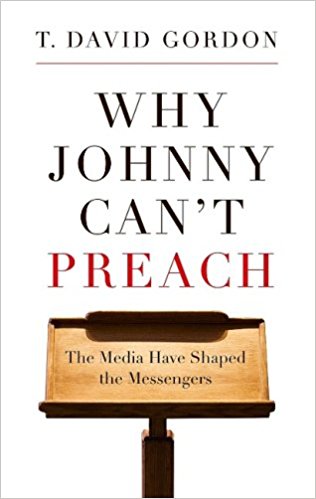In the first of this two-part series we highlighted the Philadelphia Boys’ Latin school. This institution is graduating young men of character whose language skills outstrip most of their peers. Eighty percent are going on to college.
 Anyone who learns Latin will be a better reader of English (or French, Italian, Portuguese, and Spanish, I suppose). In his book, Why Johnny Can’t Preach, T. David Gordon establishes the connection between studying a classical language and learning to read what he calls “texts,” i.e. material more substantial than John Grisham’s latest novel or Windows for Dummies. He uses the term “advanced literacy” to denote the ability to read literature, i.e. books which do more than amuse, which impart more than mere information. Not only has Western society lost much of that habit, reading of just about any sort has eroded, replaced by screen time. Americans spend 17 times as much time watching TV as they spend reading anything (including magazines and newspapers).
Anyone who learns Latin will be a better reader of English (or French, Italian, Portuguese, and Spanish, I suppose). In his book, Why Johnny Can’t Preach, T. David Gordon establishes the connection between studying a classical language and learning to read what he calls “texts,” i.e. material more substantial than John Grisham’s latest novel or Windows for Dummies. He uses the term “advanced literacy” to denote the ability to read literature, i.e. books which do more than amuse, which impart more than mere information. Not only has Western society lost much of that habit, reading of just about any sort has eroded, replaced by screen time. Americans spend 17 times as much time watching TV as they spend reading anything (including magazines and newspapers).
The loss of advanced literacy effects a slow descent for a nation. Gordon quotes Dana Gioia, 2002-2009 chairman of the National Endowment for the Arts.
Advanced literacy is a specific intellectual skill and social habit that depends on a great many educational [e.g. studying Latin], cultural, and economic factors. As more Americans lose this capability, our nation becomes less informed, active, and independent-minded. These are not qualities that a free, innovative, or productive society can afford to lose.
Gordon points out that this loss shows up even in our conversational skills.
 While waiting in an airport for a flight, or while on the flight itself, one often finds oneself chatting with a total stranger. While doing this, I discovered that I could, in less than 10 minutes, guess whether the stranger was a reader or not. After 10 minutes or so of conversation, if I guessed that the person was a reader, I would say “What have you been reading recently?” The stranger was ordinarily surprised, and would reply, “Well how do you know that I read? I haven’t mentioned reading anything.” My answer was always the same, “Your use of language reveals it. Your language patterns are those of an individual whose use of English has been shaped by more than our generation’s use of it. It is free of colloquialism and speech fads and has obviously been developed by exposure to those who use the language well and purposefully.”
While waiting in an airport for a flight, or while on the flight itself, one often finds oneself chatting with a total stranger. While doing this, I discovered that I could, in less than 10 minutes, guess whether the stranger was a reader or not. After 10 minutes or so of conversation, if I guessed that the person was a reader, I would say “What have you been reading recently?” The stranger was ordinarily surprised, and would reply, “Well how do you know that I read? I haven’t mentioned reading anything.” My answer was always the same, “Your use of language reveals it. Your language patterns are those of an individual whose use of English has been shaped by more than our generation’s use of it. It is free of colloquialism and speech fads and has obviously been developed by exposure to those who use the language well and purposefully.”
But it’s what Gordon goes on to affirm about the study of Latin (and Greek) that is especially significant to the Boy’s Latin story.
The airport game doesn’t stop here, however. I have learned that if I have 20 or 30 minutes, I can tell whether the individual writes or not; and if I have 45 minutes to an hour, I can ordinarily successfully deduce whether the individual has studied a classical language. … such as Latin or Greek.
… The highly inflected nature of classical languages creates an attentiveness to grammatical detail that causes an individual to be very precise. Specific words are ordinarily preferred to general words, for instance. Further, the inflections of Greek and Latin nouns tend to create an awareness of English case usage, even though English tends now to inflect only some pronouns. Those who consistently know when to say “she and I” as opposed to “her and me,” are almost always those who have studied a classical language … The airport game has never been scientifically tested but I also don’t recall ever being wrong.
Words and language are God’s gifts, part of the equipping He gave humans to develop healthy cultures. God, the primary creator, used words to bring into existence all that is. And He gave the gift of language to humans, the secondary creators, who use words to write stories, compose music, bless others, preach the gospel, start businesses, make just laws, teach children and plan meals. Wherever we see practices of freedom, the celebration of human dignity, the spread of shalom, respect for personal property … these are a few examples of the many benefits rooted in the robust use of language. Any Christ follower who learns Latin is well prepared for sturdy service to God and vigorous blessing to humans.
After all, God clearly puts a premium on language and words. The term “words” is used 536 times in the ESV Bible. Here, by way of closing, is a one-percent sample:
- The words of the LORD are pure words, like silver refined in a furnace on the ground, purified seven times. Psa 12:6
- The unfolding of your words gives light; it imparts understanding to the simple. Psa 119:130
- Your words were found, and I ate them, and your words became to me a joy and the delight of my heart, for I am called by your name, O LORD, God of hosts. Jer 15:16
- Heaven and earth will pass away, but my words will not pass away. Mat 24:35
Gary Brumbelow






